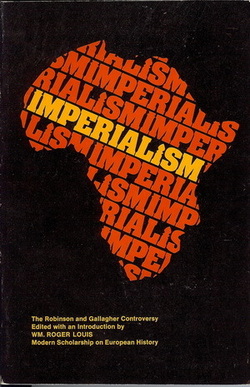
While many academic arguments suffer a stillborn-death, others crawl out of their initial environment and cheerfully permeate the field. The arguments of Robinson and Gallagher's Africa and the Victorians decidedly fit the latter category. The debates surrounding their arguments consumed many subsequent volumes, conferences, and journals. To assist in tracking the discussion (and to celebrate its proliferation) Wm. Roger Louis presents Imperialism: the Robinson and Gallagher controversy, a collection of articles and essays that wrestle with the themes of continuity, informal empire, and indigenous-European collaboration. Robinson and Gallagher challenge the notion that the major European powers felt a sudden, dramatic urge to divide and conquer Africa in the late 19th century. Rather, the authors argue that an impulse for economic expansion remained a constant throughout the entire Victorian era. Further, the official character of the expansion shifted between informal and formal empire not because of changing domestic opinion in European states, but because of changing local conditions among indigenous non-European territories. African politics especially determined the character of Victorian political practice, and not the other way around. From the fog of Victorian history, one principle emerges: "It is only when and where informal political means failed to provide the framework of security for British enterprise... that the question of establishing formal empire arose." The arguments of Robinson and Gallagher hold interest for three separate cliques of historians: economic historians, historians of Africa, and historians of generalized European imperialism. It seems that previous historians greatly over-estimated the 'divide and conquer' impulse of the late Victorian era, and incorrectly perceived the mechanics of imperial power.
Robinson and Gallagher's theme of an incessant and expansionist Victorian spirit attacked the assumptions of economic historians of both the Leninists and free-market variety, both of which assumed that the Victorian political objectives drastically changed in the last decades of the 19th century. The theme of indigenous cooperation challenged the assumptions of African studies in regards to the mechanics of European hegemony. And all the themes together created a picture suggesting that historians of European imperialism greatly over-estimated the 'divide and conquer' aspect of the late Victorian era. As Louis writes, "This is history written with a vengeance."
The debates surrounding Robinson and Gallagher raise many interesting questions: Did industrialization lead to a continuous and constant 'spirit of the age?' Should academic history concern itself with generalized theory? More practically, to what extent should historians consider the influence of individual 'characters' like Disraeli, Gladstone, or Leopold II? Such questions plow the field and keep it fresh for future students of history. Casual readers, however, may have trouble digesting the book's engagement with the particulars of Leninist and liberal economic theory.
 RSS Feed
RSS Feed